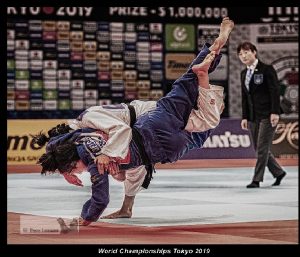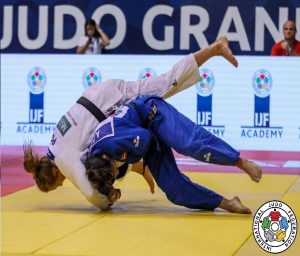Spanish judoka Ana Perez Box on Olympic ticket: “Hard work has its rewards”

Ana Perez Box has a ticket for her first Olympic Games taking place in Tokyo in 2020 but is still wary. So far, her results have been amazing, achieving silver medals in Marraketch and Ekaterinburg, as well as bronze in Budapest.
“I see the date is near, but far away too.” she says.
She can’t have a better coach than former professional judoka, Sugoi Uriarte who has gone to the Olympics himself which will give Ana the ultimate confidence.
The Top 18 judokas go to the Olympics and Ana Perez is in the Top 10 for her 52kg category. With so many points in her favour, finishing the season below that would be “very difficult”, as she says.
The qualifying process is two years long and results come from 50% of the first year’s points and 100% of the second, up to April. “You don’t only depend on your own tournaments.”

The Spanish judo team is formed by four men and five women, who travel together to world championships. However, the team also gives a place to those athletes who want to compete, but have not managed to get the ideal results. When Sports Gazette spoke to Ana, she had just returned from Brasilia’s Grand Slam without any medals, after losing her first combat against a Brazilian player.
“We were both at the same level, and although I felt fit for this competition, the victory went to her”, Perez said. However, athletes have to learn to lose and recover from bad competitions.
Other tournaments have included flying to Abu Dhabi, Australia and Osaka, China. “From now till Christmas we’ve got a tight schedule.” In spite of travelling all around the globe, the team does not have enough time to sightsee. As Ana explains, they have to stay in the hotel preparing for the competition and burning fat to fit into the weight limits of the category.
Ana and one of her teammates compete in the same category in under 52kg, but ahead to the Olympic Games, only one can go to Toyko.
The Olympic Games are seen differently by trainer and trainee. Ana, who is much more enthusiastic, thinks it is every sport professional’s dream to compete at an Olympic level. On the other side of the coin, experience has shown Uriarte that the qualifying tournaments are more important: “The media over-focus [on the Olympics].”
Ana Perez trains in the Centro de Alto Rendimiento (CAR) – High-Performance Centre – in Valencia, alongside Uriarte and around 60 other judokas. “The centre has local sponsorship which helps us with allowances, trainers’ contracts, etcetera,” Uriarte explains. Players have double daily sessions and Saturday morning training as well, so Ana gets up early to fit everything into her day.

Perez has been training judo for sixteen years and for the last six, she has been living in Valencia with her teammates. “I decided that, if I wanted to succeed, I had to leave my parents and focus exclusively on judo”, she explains. She also had to leave her friends, but has found new ones in the centre Sugoi and his wife manage.
National situation
When talking about the situation judo faces in Spain, Ana and her trainer Sugoi have different opinions.
This sport is very technical, and viewers have to know the rules in order to understand the combat, as Sugoi stresses. This doesn’t make judo a very mediatic sport, but “mass media shows what interests’ people.”
During his professional career, Sugoi Uriarte found Spanish support comforting: maybe “because my name was uncommon”, he jokes.
He thinks that Spanish sport is “enjoying a sweet moment” as the national brand has found a place amongst the top countries. The latest victory on the Spanish chart was the Basketball World Cup in China.
However, Ana Perez still needs help from the Federation even though things are improving. “We are far behind other European countries” in relation to judokas’ retirement plans.
“In Spain, studying a degree is a must if not you’re lost after your life in judo, whereas in other countries, the state provides you with a job for life,” she says also referring to her own degree in Tourism. Perez admits it is difficult to balance with her judo competitions, but she manages to find time in her busy day.
Ana will continue her preparations for the Olympics in Valencia as she looks forward to Toyko to compete in one of the biggest competitions in her career.
Sporting update
As a result of the COVID-19 pandemic, all judo events have been cancelled from March until June 30. This has meant leaving out points towards the Olympic Games, which have also been postponed until 2021. However, from the International Judo Federation, the President stated that the end of the qualifying period can be June 29, 2021.
All the events will be rescheduled and will have the same punctuation and importance as planned before the health crisis. The IJF will also give the necessary preparatory time to athletes, taking the lack of activity in these months into account.
Before lock down, Ana Perez Box finished seventh in the Dusseldorf Grand Slam. And referring to the competitions mentioned in the story, she won a silver medal in Perth, Australia. The other marks were not registered as she was eliminated in the Round of 16.